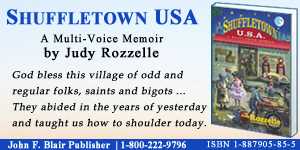Posted by Judy Rozzelle | Jun. 21, 2014, 5:15 pm
There are only a few Rozzelles living around old Shuffletown these days, many have scattered to other locations. No matter wherever we are the Catawba River and probably a little river mud courses through our veins, hearts and souls.
Generation unto generation grew up on the Catawba River where we learned to swim, ate fresh caught bass and catfish by campfires. My brother, Frank, taught me to swim by throwing me out of a john boat and telling me to swim to shore. I suspect that is how most of us learned to swim back then. After all, we were river rats.
Families shared Sunday dinners at the long tables with city folk. Every one passed the platters of fried country ham, fried chicken, and fried fish caught daily from the river. Bowls of vegetables and relishes were next. No plate, bowl or platter was ever empty and the ice tea flowed.
The Catawba River has supported my family since around 1768 when it was called the Abernethy Ferry. In the early 1800s, a young Rozzelle from down east reached the Catawba River and fell in love with the ferryman’s daughter.
When the Abernethys completed their life’s journey, their Rozzelle grandsons ferried the river until the first covered bridge was built across the Catawba. When the bridge was burned during the Civil War we ferried the river once more. Another bridge was constructed, but the 1916 flood swallowed the bridge, the three-story Mountain Island Mill, and pushed a train engine off its trestle into the river where it still rests. The Rozzelle Ferry was back in business until 1929 when Duke Power completed the new bridge and opened the coal-fired steam plant. The old Rozzelle home stood above the river for more than two hundred years. It was burned to the ground by arsonists in the winter of ‘91.
Today, the only property I own near the river is a family cemetery on the Riverbend Penisula. Buried in this cemetery are the first settlers who built the first log cabins along the river’s banks. Some of the names are Cansler, Henderson, Fite, Abernethy, and Rozzelle. But there are more in unmarked graves whose gravestones were washed away in the 1916 flood. The biggest loss was an ancient Catawba Indian burial ground for it was swept into history.
There is a section of woods on the Riverbend Peninsula that is haunted. Old timers used to tell that no hunter could keep his hounds calm enough to hunt there. Instead, the hounds once unleashed they howled and ran for home as if they were running from the Hounds of Hell. I have been told that when the moon is dark and the wind is high, you can still hear echoes of howling dogs. Gold mines once riddled the peninsula. Confederate gold is said to have been buried on the peninsula in April of 1865. Down the Catawba River settlers sent cotton, iron, and produce for markets in Charleston and eventually their products reach the European markets. The history of this area begins with the Catawba River.
On Friday night, June 20, 2014, in the silence of twilight, I cruised the river with friends. Immediately, along the shallow waters, a heron flew parallel to our boat. We rode by an osprey nest and two osprey chicks chirped for dinner. The river was wide and the wind welcomed me back. Still, I returned home in sadness.
We rode around the end of the peninsula to a sand bar where children can swim and on weekends adults play. The boat was in the middle of the river far from shore and the river was only a few feet deep. So much sand and silt has washed onto the sand bar that in order not to harm your boat, you have to negotiate carefully around the sand bar.
We had Goat Island, sand bars and all when I was young, but nothing like this that I remember. The sand bar is grows when bulldozers break ground for a new housing development. While we were resting by the sand bar, I was told that a developer is preparing to build four hundred new homes on the tip of the peninsula. There will be sixty new boat landings built across from the sand bar. From what I understand those sixty piers will have to be built deep into the river to get past the shallow waters. This is what I have learned from the river neighbors. Many voices came from those who have spent their lives on the river and they have a lifetime of river knowledge.
The silt from the new development will build up the sand bar until it becomes a dangerous obstacle for boating. This is only my opinion, I have no engineer degree, but I believe that those who have lived by the river know it best. This is what I believe will happen. Maybe not during my lifetime, but developers are forever changing the geography of the river.
A beautiful new riverfront neighborhood will be built and nice people will move into the homes, townhouses and condos that are to be built. The river will become more polluted and the river bed will be thick with coal ash and silt. Already, we are advised not to eat the fish caught from the Catawba.
My concern is this. The water for homes from Belmont to Ballantyne to Rock Hill comes from the Catawba River. It is in danger now from the coal ash dams which currently have more than twelve places where coal ash is leaking into the Catawba. Daily. If the coal ash dam fails, we will have only a 24-hour warning, if that. I was told by a reliable source that Charlotte-Mecklenburg has only enough water in reserve to last for two days. Then our lives would become a nightmare.
The Rozzelles are pretty much history now, but I am dismayed by the damage done by the people who have claimed the river. Why are we not doing more to guarantee that our children and grandchildren will have clean water to drink and a river clean enough to swim? We can save the river, if we will? Or we can turn away and let it be polluted.
One does not own land or a river, we are only the caretakers. It is a huge responsibility and we should do no harm. Listen, whatever flows into the Catawba River runs through our faucets. How many chemicals do you want to swallow?


